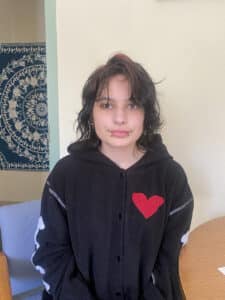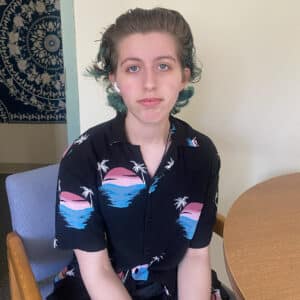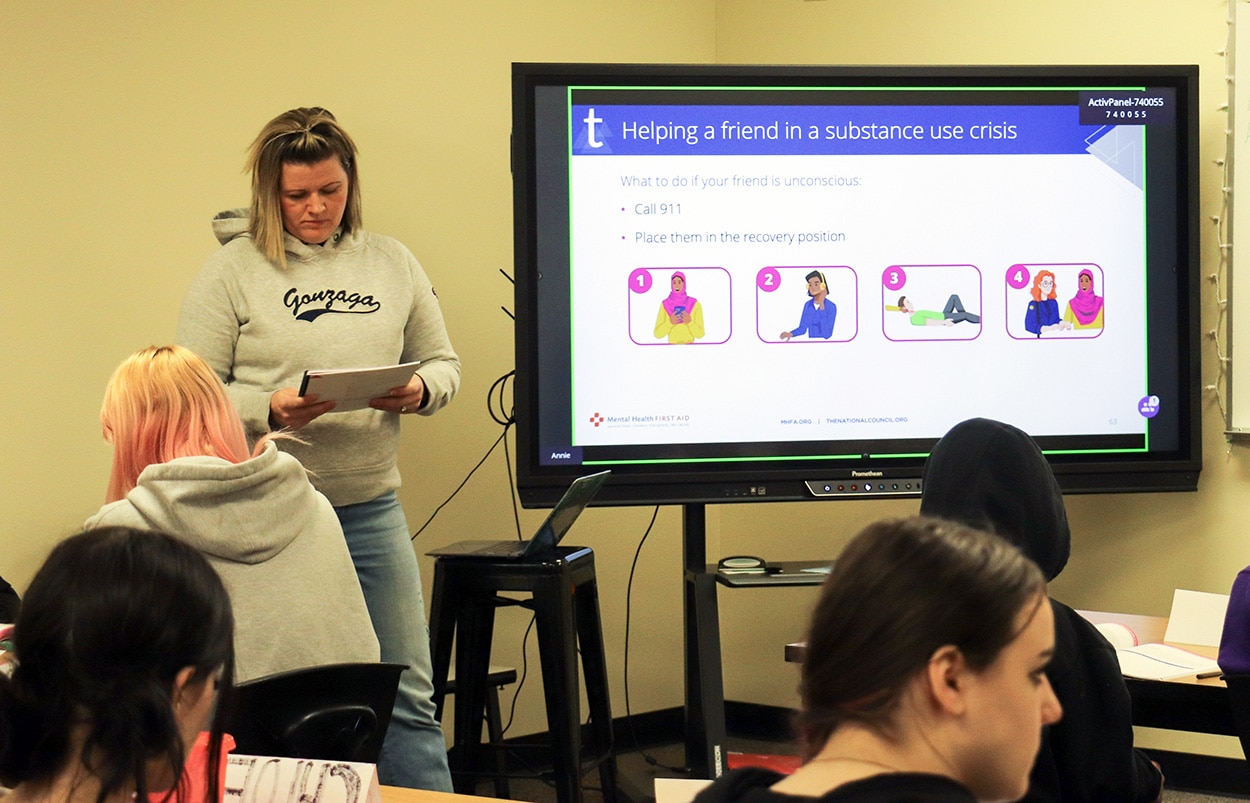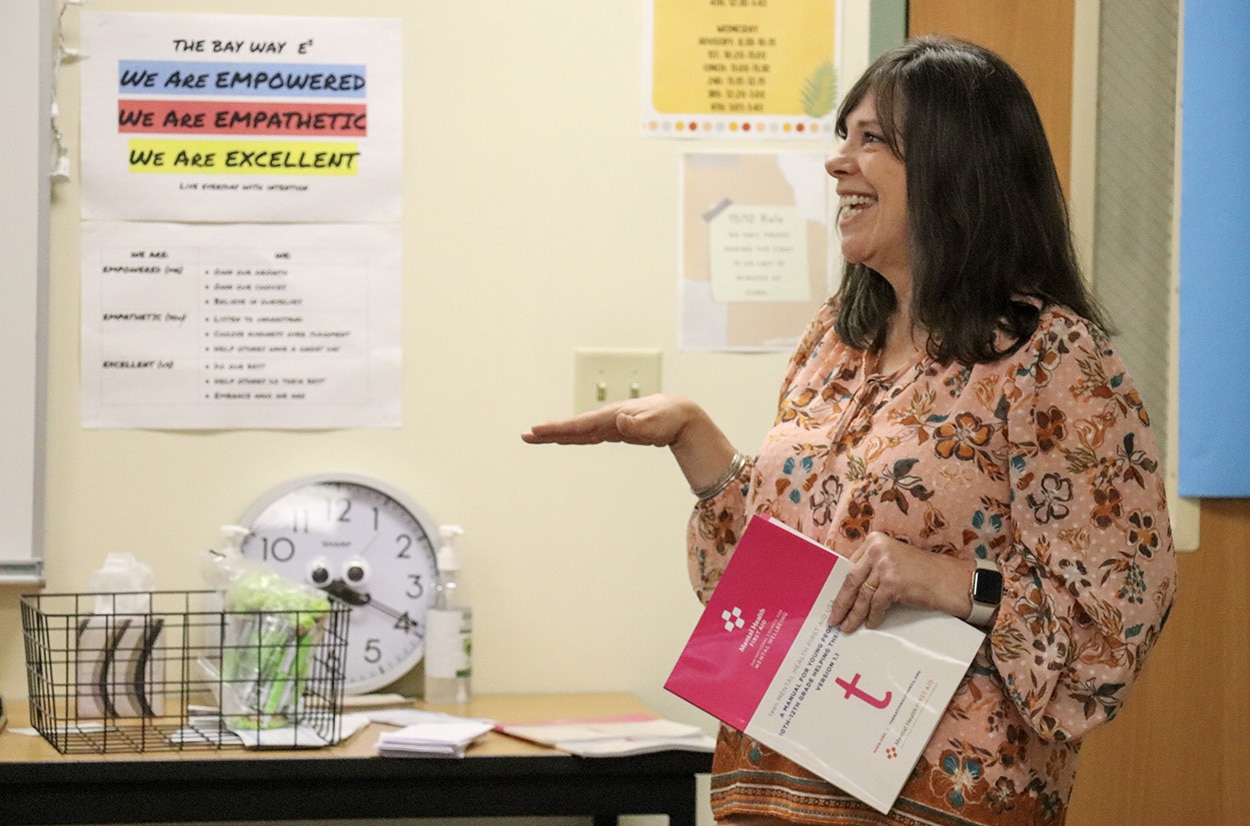Community Education Health & Wellness
Students learning mental health first aid
Editor’s note: This story deals with mental health issues, including suicide. If you or someone you know needs help, text HOME to 741741, the Crisis Text Line, or call or text 988, the Suicide & Crisis Lifeline.
Education Sponsor
Education stories are made possible in part by Tacoma Community College, a proud sponsor of Gig Harbor Now.
When someone is having a heart attack, most people know to call 911 and start CPR. But what about someone experiencing a mental health crisis?
Students at Henderson Bay High School recently gained new tools to help friends who are struggling through the Mental Health First Aid training. The training addressed a range of challenges, such as anxiety, depression, suicidal thoughts, eating disorders and substance use.
Students learned specific steps to take in different scenarios, all following an easy-to-remember pattern of response.

Noah Cedarland, a 10th grade student at Henderson Bay High School, took the teen Mental Health First Aid training in March. The training provides tools and resources to help friends experiencing mental health challenges.
Noah Cedarland, in 10th grade, said the training was way more effective than information on mental health given in assemblies or health class.
“Sometimes, the courses tend to be really cheesy and more so like you’d just have the message of ‘just be happy,’” Cedarland said. “But this one seemed real, and it was more up front about the actions you can do to actually help people.”
It’s really common
According to the CDC, 42% of high school students in 2021 felt so sad or hopeless every day for at least two weeks in a row that they stopped doing their usual activities. Female and LGBTQ+ students experienced persistent feelings of sadness or hopelessness at a higher rate than males.
But Cedarland doesn’t need statistics to know that. He’s struggled with anxiety and depression “pretty much my whole life.” And he’s not alone.
“It’s really common,” he said. “If I’m in a group of 10 people, there’s going to be at least half of them struggling with mental health stuff.”
Henderson Bay was one of the first schools in Pierce County to receive the teen Mental Health First Aid training. The program is being gradually rolled out around the state. Peninsula School District hopes to expand the training to all 10th through 12th grade students. A training for ninth grade students is being developed.
A timely training
While individual reasons for mental distress are complex, the pandemic most certainly aggravated the mental health of students as a whole.

Toby Coggin took a teen Mental Health First Aid training in March.
“It was definitely hard to be away from my social circle, people that I trusted and felt comfortable being around, and they helped me a lot,” said Toby Coggin, another Henderson Bay 10th grader who completed the training in March.
Isolation, loss of consistency and loss of resources disrupted students’ lives with potential long-term consequences, said Annie Schuster, counselor at Henderson Bay.
“I think our students have been immensely impacted, especially our most vulnerable, which is the population that we serve here,” she said. “You know, it’ll be an interesting study for years to come, how this is impacting us. It’s not over. We’re just back into the routine of things as though it’s over. But kids have been impacted significantly, all the way through from birth through high school.”
Now more than ever, there’s a tremendous need for people of all ages who can respond effectively and compassionately to someone in crisis, said Becky Maffei, lead counselor for the district. Mental Health First Aid is designed to meet that goal.

Henderson Bay High School Counselor Annie Schuster goes over steps to help a friend in a substance use crisis as part of a teen Mental Health First Aid training given in March to all 10th through 12th grade students at the school. The training gives teens tools and resources to help friends experiencing mental health challenges.
Strategies that work
Research shows that teens prefer sharing challenges with their peers. With that in mind, the National Council for Wellbeing adapted teen Mental Health First Aid, which originated in Australia, for American teens. Some funding came from Lady Gaga’s Born This Way Foundation.
The course includes three 90-minute segments. It is similar to Mental Health First Aid U.S. for adults but is geared to students in 10th through 12th grades.
Peer-reviewed studies on Mental Health First Aid conducted over the past decade show those trained in the program were better able to spot warning signs of mental health challenges, and they were more likely to help an individual in distress. In addition, they used the skills and information they learned to better manage their own mental wellbeing.
Stopping the stigma
Mental Health First Aid takes steps to reduce the stigma surrounding mental health challenges, substance use and suicide. Stigma can lead to discrimination and can lead people to avoid seeking help, according to the course manual.
The training gives clinical descriptions of conditions and common myths associated with them. For example, the perception that all people with mental health challenges are dangerous, or that only certain people experience mental distress.
“Unfortunately, it is an equal opportunity illness,” said Laurel Shultz, program director for Communities in Schools of Peninsula, who co-presented the training. “Mental health can affect anyone at any time. And so can addiction, so we can’t assume or stereotype.”

Laurel Shultz, program director for Communities in Schools of Peninsula, explains concepts of teen Mental Health First Aid during a training in March at Henderson Bay High School. The training was available to students in 10th through 12th grade. Students had the choice to opt out, but no one did.
Action plan outlined
The Teen Mental Health First Aid training teaches an action plan that is adaptable for use during a crisis or while a mental health challenge is developing. They learn to recognize the warning signs of different mental health conditions and how to support the person until they can get other help. They learn how to guide the person toward seeking help from a trusted adult who can then take over caring for them.
Teens learn to stay safe and keep their friend safe during a crisis. And they learn how give ongoing support without taking on the responsibility for them getting better.
Students at Henderson Bay has the option to skip the training. None did. Professionals were on hand during and after the training to provide support.
‘A multi-agency effort’
The teen Mental Health First Aid training at Henderson Bay was co-taught by Schuster, Shultz Maffei and Anne Nesbit, spokeswoman and public education officer for Key Peninsula Fire.
The district received funding from the Tacoma-Pierce County Health Department to implement the program. It is part of a wider multi-agency effort to promote mental wellness.
Shultz and Nesbit are are part of the Gig Harbor Key Peninsula Suicide Prevention Coalition. They have conducted suicide prevention training on request for adults in the community.
Shultz has given Mental Health First Aid training to Communities in Schools coordinators, who work with staff in local schools. Maffei and Shultz have trained not only district staff but also community members.
It’s a “layered” approach with the long-term goal of offering training to anyone who wants it, Shultz said.
‘More boots on the ground”
Shultz and others have been meeting with principals at both Peninsula and Gig Harbor High about expanding the program. Administrators are open to the training, she said.
To qualify for the teen program, however, a school must have at least 10% of its staff trained in Mental Health First Aid. Henderson Bay, with around 120 students, easily met that requirement. Training more staff at both of the larger high schools will take time, Shultz said.
Instructors hope Mental Health First Aid will one day be as commonplace as First Aid training for physical injuries and illness.
Nesbit says teen Mental Health First Aid brings the movement “full circle.”
“We’re training adults who work with kids, and then we’re training the kids,” she said. “So, it really helps reduce the stigma, and it creates a situation where there’s more boots on the ground.”
Anyone interested in Mental Health First Aid can contact Nesbit at [email protected] or (253) 884-2222; or Shultz at [email protected] or (253) 509-9396.

